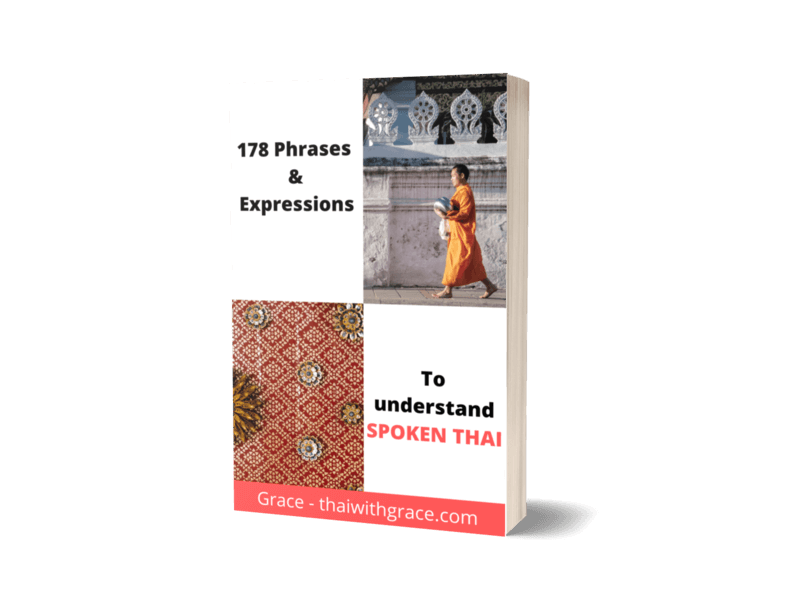The question words in Thai ใคร (krai), เมื่อไร (mêua rai), ที่ไหน (têe năi), อะไร (à-rai), ไหน (năi), อย่างไร (yàang rai) (who, when, where, what, which, how) can become whoever, whenever, wherever, whatever, whichever, and however depending on the sentence. Let me explain.
In a question, the question words need to be put at the end of the sentence (except เมื่อไร mêua rai which can also be placed in front). But to change it the question words to “-ever” you have to put them at the beginning of the sentence. Let’s take a look at some examples for question words.
To learn more about the question words in Thai, please read my article on question words in Thai and how questions in Thai.

How to turn question words into -ever
Place the question word + ที่ in front of the sentence to make it ‘-ever’ (whoever, whenever, wherever, whatever, whichever, however). You can also put ก็ตาม gôr dtaam in between. It’s optional.
The formula is: question word + ที่ + rest of sentence.
Whoever in Thai
- Whoever doesn’t want to do, doesn’t have to do.
ใคร(ก็ตาม)ที่ไม่อยากทำก็ไม่ต้องทำ
krai (gôr dtaam) têe mâi yàak tam gôr mâi dtông tam
Whenever in Thai
- Whenever I call you I want you to drive out.
เมื่อไร(ก็ตาม)ที่ฉันโทรไปให้เธอขับรถออกมา
mêua rai (gôr dtaam) têe chăn toh bpai hâi ter kàp rót òk maa
Wherever in Thai
- Wherever you are, that’s where I will be.
ที่ไหน(ก็ตาม)ที่มีคุณที่นั่นก็มีผม
têe năi (gôr dtaam) têe mee kun têe nân gôr mee pŏm
Whatever in Thai
- Whatever he says, don’t believe him
อะไร(ก็ตาม)ที่เขาพูดไม่ต้องไปฟัง
à-rai (gôr dtaam) têe kăo pôot mâi dtông bpai fang - Whatever you choose is fine
อะไรที่คุณเลือกก็ดีหมด
à-rai têe kun lêuak gôr dee mòt
Whichever in Thai
Whichever requires a classifier in front of ไหน. For example, อันไหน (an năi), คนไหน (kon năi), etc.
- Whichever person wants to go get out of the car immediately
คนไหนที่อยากไปช่วยขึ้นรถทันที
kon năi têe yàak bpai chûay kêun rót tan tee - Whichever you want tell me
อันไหนที่อยากได้ก็บอก
an năi têe yàak dâai gôr bòk
However in Thai
The exception to the rule is “however”. อย่างไรที่ is not spoken in Thai. And อย่างไรก็ตาม means however but in the other sense such as in the sentence “I like her however she doesn’t like me”.
If you want to say “however” you would say อย่างไรก็ได้ (yàang rai gôr dâai).
- However you write it is fine
เขียนอย่างไรก็ได้
kĭan yàang rai gôr dâai
Question word + ก็ได้
If you want to omit all the information and just say like whoever is fine, whatever is fine, whenever is fine, etc. All you have to do is say the question word + ก็ได้ (gôr dâai).
Please note that ก็ได้ (gôr dâai) means ‘it’s fine, it’s okay, it’s possible’.
Let me show you examples:
- Whoever is fine
ใครก็ได้
krai gôr dâai
- Whenever is fine
เมื่อไรก็ได้
mêua rai gôr dâai
- Whatever is fine
อะไรก็ได้
à-rai gôr dâai - Whichever is fine
อันไหนก็ได้
an năi gôr dâai - However is fine
อย่างไรก็ได้
yàang rai gôr dâai
I hope you now know how to say whoever, whenever, wherever, whatever, whichever, however in Thai.

